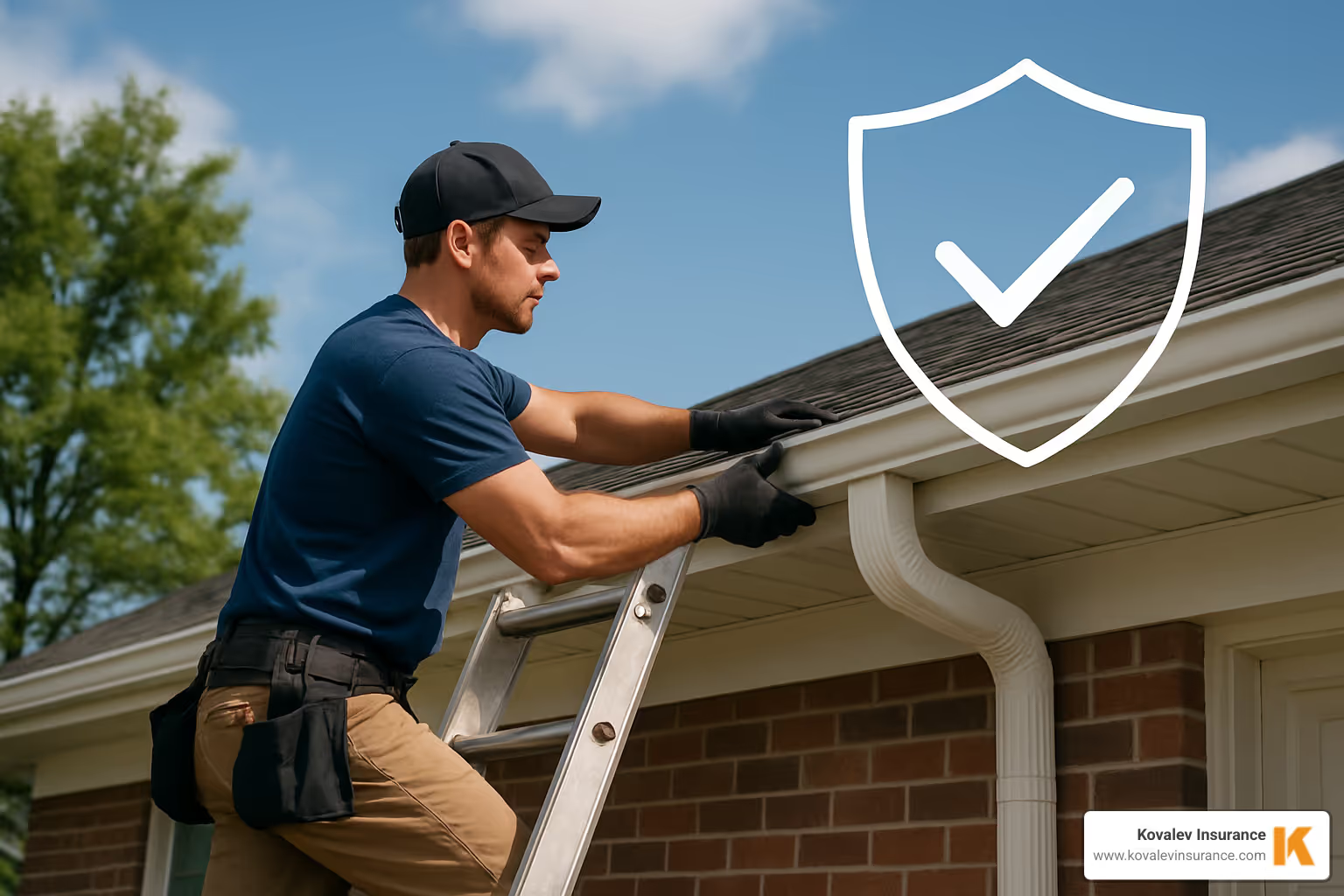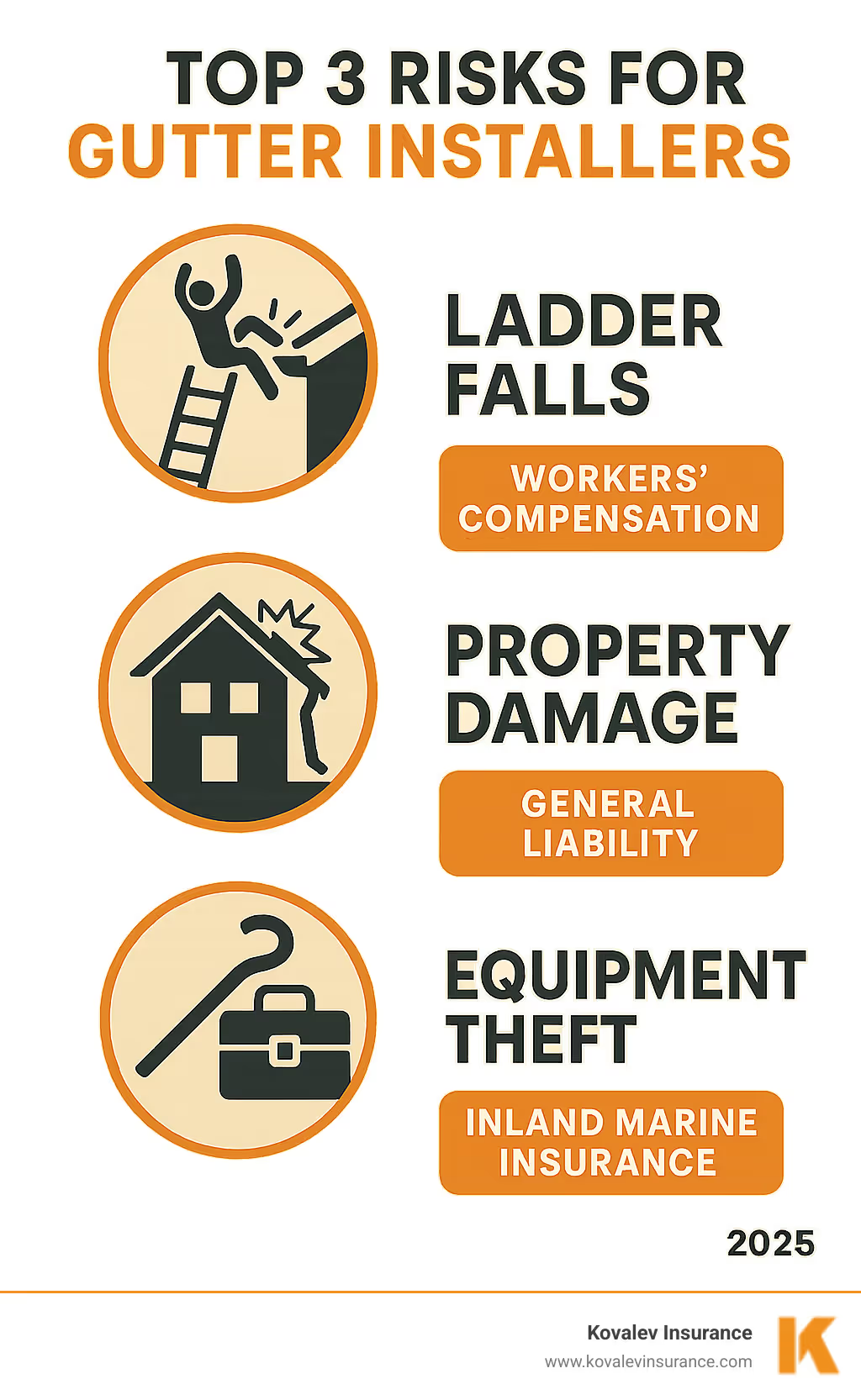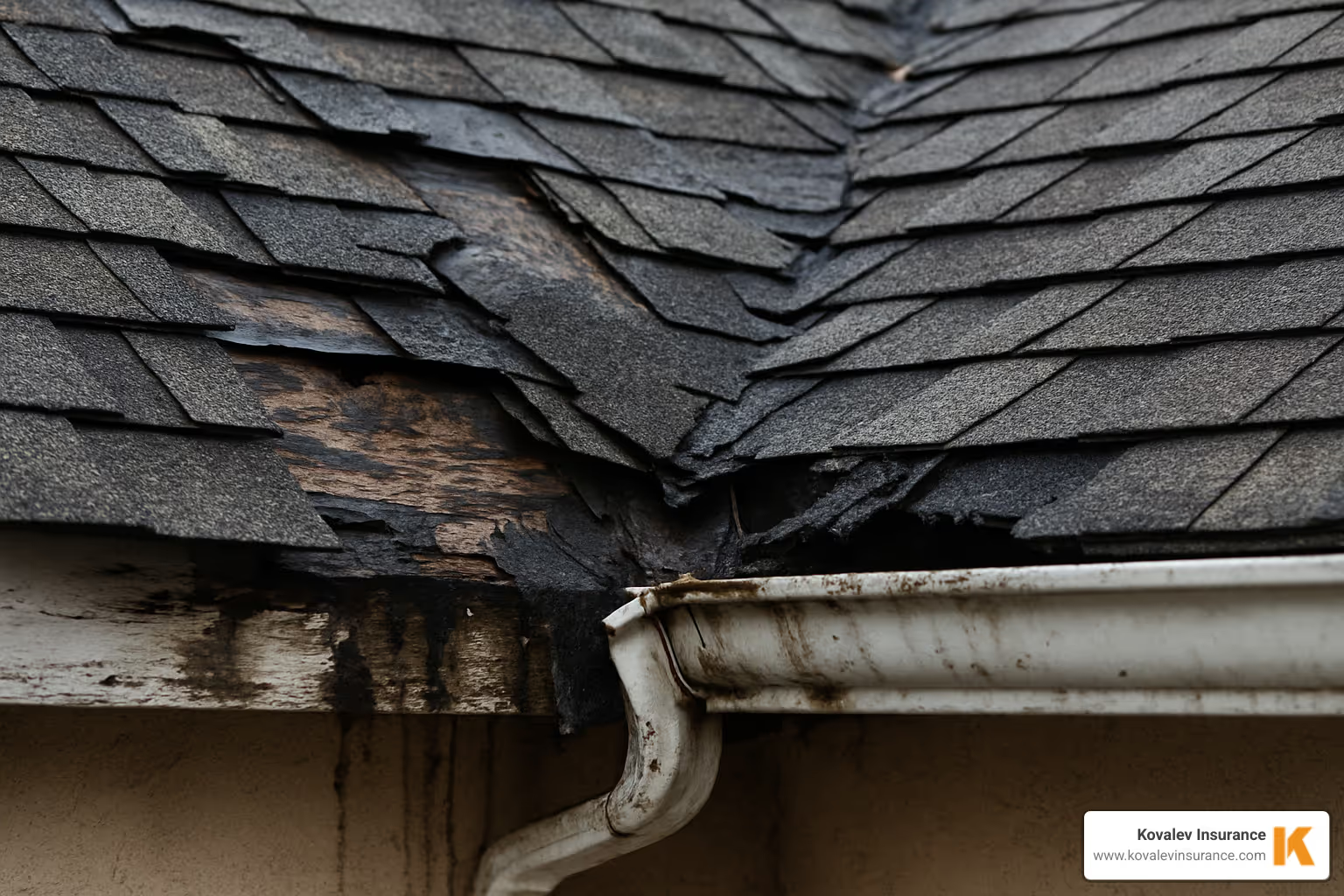Blog Content
18
Sep
2025

Gutter installer insurance is essential business protection that covers liability claims, property damage, and employee injuries that can occur during gutter installation and repair work. For Massachusetts contractors, this specialized coverage protects against the unique risks of working at heights, handling heavy materials, and operating on client properties.
Essential Coverage Types for Gutter Installers:
According to the Bureau of Labor Statistics, 2.8 million nonfatal workplace injuries and illnesses occurred in private industry in 2019, making proper insurance coverage crucial for trade professionals. The nature of gutter installation work - climbing ladders, working at heights, and handling heavy materials - creates significant liability exposure that can result in costly claims.
Common risks include:
The average cost for general liability coverage ranges from $47 to $79 per month, while workers' compensation insurance typically costs $500 to $1,500 annually. These modest premiums provide essential protection against claims that could otherwise bankrupt a small business.
For Massachusetts contractors working in Newton, Wellesley, Brookline, Needham, Belmont, and Natick, having proper insurance isn't just smart business - it's often required by clients and state regulations. Fines for not carrying workers' compensation insurance can reach up to $10,000.


Running a gutter installation business in Massachusetts means facing some pretty unique challenges that other states just don't deal with. Between our brutal New England winters, aging colonial homes, and strict state regulations, gutter installer insurance becomes absolutely critical for protecting your business.
Working at heights is already risky enough, but add in Massachusetts' unpredictable weather patterns and you've got a recipe for trouble. One minute it's sunny, the next you're dealing with sudden rain showers or unexpected ice patches. I've seen too many contractors in Newton and Wellesley get caught off guard by weather changes that turned routine jobs into dangerous situations.
The electrocution risk is particularly serious here. Many older homes in Brookline and Needham have power lines running close to gutters, and Massachusetts has zero tolerance for electrical safety violations. Working in wet conditions only amplifies this danger. Then there's pest exposure - old gutters are breeding grounds for wasps, bees, and other critters that can cause serious allergic reactions.
New England weather damage creates a vicious cycle. Harsh winters and frequent storms mean more gutter repairs, which means more time on ladders in challenging conditions. The freeze-thaw cycles we experience can make gutters unpredictable and materials more brittle.
For a deeper dive into what contractors face in our state, check out the Risks Facing Artisan Contractors in Massachusetts. The statistics on work‐related injuries in trade professions are eye-opening and show why proper coverage isn't optional.
Ladder falls are the nightmare scenario every gutter installer worries about, and unfortunately, they're all too common. These accidents don't just result in a few bruises - we're talking about serious back injuries, broken bones, and sometimes permanent disability that can end careers.
The physical demands of gutter work take a toll over time. Repetitive stress injuries are practically inevitable when you're constantly lifting, reaching, and working overhead. Your back, shoulders, and knees bear the brunt of this repetitive strain.
Electrocution remains a constant threat, especially when working near power lines or during wet conditions. Even brief contact with electrical wiring can cause severe burns or worse. Cuts and lacerations from sharp metal edges are part of the job, but they can lead to serious infections if not properly treated.
Respiratory illness from mold is something many contractors don't think about until it's too late. Old gutters are breeding grounds for mold spores, and prolonged exposure can cause lasting health problems. According to the Bureau of Labor Statistics, workplace injuries are a significant concern for all private industries, but construction trades face particularly high rates.
Property damage claims can be just as devastating as injury claims, sometimes more so. Damaged siding or roofing happens when ladders slip or shift unexpectedly. What starts as a simple gutter job can quickly turn into thousands of dollars in exterior repairs.
Broken windows from falling debris are surprisingly common, especially on the multi-story homes you'll find throughout Needham and Belmont. A single dropped tool or piece of gutter can shatter an expensive window and create an unhappy customer.
Don't underestimate damaged landscaping claims. Those beautiful foundation plantings and expensive hardscaping features can result in significant repair costs. Water damage from faulty installation is the big one though - when gutters fail to properly divert water, the resulting damage to foundations, basements, and interior finishes can reach tens of thousands of dollars.
Falling tools or materials pose risks to everything below. A dropped gutter section can easily damage a client's car parked in the driveway, and accidents involving third-party property like neighbor's vehicles or outdoor furniture can quickly escalate into expensive claims that threaten your business's financial stability.

Even with careful planning, a Newton or Wellesley job can turn expensive in seconds. The four coverages below form the backbone of a solid gutter installer insurance package, shielding your cash flow, equipment, and employees from the most common Massachusetts hazards.

What it does: Pays for third-party property damage, bodily injury, and related legal costs.
Why you need it: A ladder scratch on a Brookline client’s Tesla or a falling gutter that injures a neighbor can produce five-figure bills. General liability handles those costs and the attorney fees that follow. It also includes completed-operations protection if a gutter you installed last fall fails during a Nor’easter. Get the details at our guide to General Liability Coverage in Massachusetts.
What it does: Covers employee medical expenses, lost wages, rehab, and death benefits after a work injury.
Why you need it: Massachusetts law makes workers’ comp mandatory for most employers, and penalties reach $10,000. One ladder fall in Needham can easily top six figures in medical care. Learn more at Worker Compensation Insurance in Massachusetts.
What it does: Insures your work trucks and vans for liability and physical damage, and can extend to rented or employee-owned vehicles used for business.
Why you need it: Personal auto policies exclude business use. If you rear-end another vehicle on Route 9 with a load of gutters, commercial auto pays for the damage, injuries, and even stolen tools that were in the truck. See options at Best Massachusetts Commercial Auto Insurance.
What it does: Protects tools, gutter machines, and other gear while they’re in transit or on a job site.
Why you need it: A Belmont job site can empty fast when thieves spot an unattended trailer. Inland marine reimburses you for stolen or damaged equipment so work doesn’t grind to a halt. Full details are in our guide to Top Inland Marine Insurance Coverage in Massachusetts.
Together, these four coverages create a leak-proof financial shield, letting you focus on quality installs instead of worst-case scenarios.

When gutter contractors ask me about gutter installer insurance costs, I always tell them the same thing: it's one of the smartest investments you'll make for your business. The numbers might surprise you - in a good way.
General liability insurance typically runs between $47 and $79 per month for most small gutter installation businesses in the Boston area. Workers' compensation insurance costs around $500 to $1,500 annually, depending on your payroll and number of employees. When you consider that a single serious injury claim could cost $100,000 or more, these premiums start looking pretty reasonable.
I've seen too many contractors hesitate over these costs, only to face devastating financial consequences later. One ladder fall, one damaged luxury car in a Wellesley driveway, or one faulty installation that causes water damage can quickly wipe out years of profits - and potentially your entire business.
The reality is that these premiums represent a tiny fraction of your annual revenue but provide protection against claims that could easily exceed your insurance costs by 100 times or more. It's like buying a $500 umbrella to protect yourself from a $50,000 rainstorm.
Your business location makes a significant difference in what you'll pay. If you're primarily working in Newton or Brookline, where home values routinely exceed $1 million, you'll typically pay higher premiums than contractors working in areas with more modest property values. The reason is simple - when something goes wrong, the potential damages are much higher.
Annual payroll and number of employees directly impact your workers' compensation costs. More employees mean greater exposure to potential workplace injuries. However, don't let this discourage you from growing your team. Businesses with strong safety records often qualify for experience modification factors that can reduce premiums by 20% or more.
The services you offer also affect your rates. Pure gutter installation work typically carries higher premiums than gutter cleaning due to the increased complexity and risk involved. If you offer both installation and cleaning services, make sure your insurance provider knows about all your operations to avoid any nasty surprises if you need to file a claim.
Your claims history is probably the most important factor in determining your premium. A clean record can result in substantial discounts, while frequent claims can drive costs up significantly. This is why investing in proper safety training and equipment isn't just good for your employees - it's good for your bottom line.
Coverage limits and deductibles give you control over your costs. Higher deductibles reduce your monthly premium but increase your out-of-pocket expenses when claims occur. I work with my clients to find the sweet spot that provides adequate protection without breaking the bank.
Years of experience in the business can work in your favor. Established contractors with proven track records often qualify for better rates than brand-new businesses. Insurance companies view experience as a strong indicator of lower risk.
Here's where things get interesting from a cost perspective. A Business Owner's Policy (BOP) combines your general liability and commercial property insurance into one streamlined package. This bundling typically saves you 10-15% compared to purchasing these coverages separately.
The BOP often includes business interruption coverage as a bonus. This pays for lost income if your business gets temporarily shut down due to covered property damage. For a small gutter installation business, even a week of downtime can mean thousands in lost revenue.
The cost-effectiveness of a BOP makes it particularly attractive for smaller operations. You get comprehensive protection with simplified paperwork and just one renewal date to remember. It's like getting a combo meal - more convenient and cheaper than ordering everything separately.
For more details about how a BOP can save you money while providing comprehensive protection, check out our guide to Commercial Business Owner Insurance in Massachusetts.
The bottom line? Gutter installer insurance isn't an expense - it's an investment in your business's future. The peace of mind alone is worth the modest cost, and the financial protection could literally save your business.

Running a legitimate gutter installation business in Massachusetts means more than just knowing how to hang gutters properly. You need to steer state regulations, local ordinances, and safety requirements that can feel overwhelming - but they're actually designed to protect both you and your clients.
The good news? Staying compliant isn't just about avoiding fines. It builds trust with customers, can lower your gutter installer insurance premiums, and sets you apart from fly-by-night contractors who cut corners. When homeowners in Newton or Wellesley see your proper licensing and insurance certificates, they know they're dealing with a professional.
Massachusetts takes contractor licensing seriously, and for good reason. The Home Improvement Contractor (HIC) registration is your ticket to legally performing most gutter installation work in the state. This isn't just paperwork - it's proof that you've met basic standards for financial responsibility and competence.
Getting your HIC registration involves background checks and proof of insurance, which means you're already ahead of unlicensed competitors. The state wants to make sure you can actually complete the work and handle any problems that arise.
For larger commercial projects, you might need a Construction Supervisor License (CSL). This applies to jobs exceeding certain dollar thresholds and demonstrates advanced knowledge in construction management. While not every gutter installer needs this license, it opens doors to bigger, more profitable projects.
Here's something many contractors overlook: written contracts are required by Massachusetts law for home improvement work exceeding $1,000. This protects both you and your clients by clearly defining scope, price, and timeline. It also helps prevent the "he said, she said" disputes that can lead to costly legal battles.
Don't forget about local requirements either. Communities like Brookline and Needham often have specific ordinances about permits, noise restrictions, or working hours. A quick call to the local building department can save you from expensive violations and unhappy neighbors.
Smart safety practices do double duty - they protect your crew and can actually reduce your workers' compensation premiums. Insurance companies love businesses with formal safety programs and often offer significant discounts to reward good safety records.
Proper ladder safety techniques are non-negotiable in this business. That means maintaining three-point contact, setting up at the correct angle, and never overreaching. It sounds basic, but ladder falls are the leading cause of serious injuries in our industry.
Your crew should never work without Personal Protective Equipment (PPE). Hard hats, safety glasses, and non-slip footwear aren't suggestions - they're essential gear that can prevent life-changing injuries. The cost of PPE is nothing compared to a single workers' compensation claim.
Regular tool and vehicle inspections help you catch problems before they cause accidents. A frayed electrical cord or worn ladder rung might seem minor, but these small issues can lead to major injuries. Make inspections part of your routine, not an afterthought.
Employee safety training programs should cover both general safety principles and job-specific hazards. New employees need thorough training, but even experienced workers benefit from regular refresher sessions. The construction industry changes, and so do safety best practices.
Finally, maintaining a clean and organized worksite prevents the trips, falls, and other accidents that seem minor but can result in serious injuries. A cluttered job site is a dangerous job site, and it also looks unprofessional to clients.
Regular safety meetings give your team a chance to discuss new hazards or concerns. Document these efforts - if claims do occur, your safety program can help demonstrate that you take worker protection seriously. Insurance companies notice this commitment, and it often translates to better rates and fewer claims.
Yes, most gutter installer insurance policies can be structured to cover related services like gutter cleaning, repair, and maintenance. The beauty of working with an experienced agent is that we can customize your coverage to match exactly what your business does.
Gutter cleaning actually involves many of the same risks as installation work. You're still working at heights, there's potential for property damage, and you face similar hazards like ladder falls or debris hitting windows. The good news? Adding cleaning services to your policy typically doesn't cause a dramatic premium increase since the underlying risks are so similar.
Here's what I always tell my clients in Newton and Wellesley: be completely honest about every service you offer. If you're planning to expand into pressure washing next spring or you occasionally help clients with minor roof repairs, let us know. It's much better to have coverage you don't need than to need coverage you don't have.
The worst thing that can happen is having a claim denied because you didn't disclose all your services. We've seen contractors get into trouble because they thought their "basic" gutter installation policy would cover everything they do. Don't make that mistake.
This is one of the most common questions I get from contractors in Brookline and Needham, and it's a smart thing to worry about. If you hire subcontractors, you should ensure they carry their own insurance, including workers' compensation. It's best practice to collect a Certificate of Insurance (COI) from them before they begin work.
Here's the reality: Massachusetts law can hold you responsible for subcontractor injuries if they don't carry proper insurance. I've seen contractors get hit with massive claims because they assumed their "independent contractor" was truly independent when it came to insurance coverage.
The safest approach is simple but firm. Before any subcontractor sets foot on a job site, get their current Certificate of Insurance. Check that their workers' comp is active and their general liability limits are adequate. Keep these certificates in a file - you'll need them if questions arise later.
Some general liability policies include limited coverage for subcontractor injuries, but this shouldn't be your primary protection. Think of it as a backup, not your main defense. The subcontractor's own insurance should be the first line of coverage.
Absolutely yes. This is probably the biggest misconception I encounter among small business owners. An LLC protects your personal assets from business debts and liabilities, but it does not protect your business assets. If your business gets sued for property damage or an injury, insurance is what protects your company's finances, tools, and equipment.
Think of it this way: an LLC is like a fence around your house (personal assets), while insurance is like a security system for your business. Both are important, but they protect different things in different ways.
Without proper insurance, a serious claim could wipe out your business assets, equipment, and cash flow - even if your personal home and savings remain protected by the LLC structure. I've worked with contractors who learned this lesson the hard way after spending thousands on legal fees to set up an LLC, only to lose their business equipment and cash flow because they skipped on insurance.
Whether you're operating as a sole proprietorship, LLC, or corporation, General Liability Coverage in Massachusetts remains essential. The LLC protects you personally, but your business still needs its own protection to survive and thrive.
Running a gutter installation business in Massachusetts without proper insurance is like working without a safety harness - you might be fine for a while, but one slip can be catastrophic. In the competitive greater Boston market, gutter installer insurance isn't just protection; it's your ticket to long-term success and peace of mind.
The numbers tell the story clearly. With workers' compensation fines reaching $10,000 for non-compliance and liability claims potentially costing hundreds of thousands of dollars, the modest monthly cost of proper coverage becomes a no-brainer. A single serious injury or property damage claim could easily cost more than decades of insurance premiums.
Think about it this way: you wouldn't drive your work truck without auto insurance, so why would you operate your business without comprehensive coverage? The risks are simply too great, and the protection is too affordable to go without.
At Kovalev Insurance, we've spent years helping Massachusetts contractors steer these challenges. We understand that gutter installers in Newton face different risks than those working in Natick, and we tailor our coverage recommendations accordingly. Our clients appreciate our straightforward approach - no confusing jargon, no hidden fees, just honest advice and competitive rates.
Your business deserves protection that works as hard as you do. When you're focused on providing excellent service to your clients throughout Wellesley, Brookline, Needham, and Belmont, you shouldn't have to worry about whether you're properly covered. That's our job.
The peace of mind that comes with comprehensive coverage is invaluable. You can bid on larger projects with confidence, knowing you're protected. You can sleep better at night, knowing that an accident won't destroy everything you've built. Most importantly, you can focus on growing your business instead of worrying about what could go wrong.
Don't let another day pass without proper protection. The expert team at Kovalev Insurance is ready to help you find the perfect policy for your specific needs. We make the process simple, fast, and surprisingly affordable.
Request your personalized quote for Artisan Contractors Insurance today and take the first step toward securing your business's future. Your success depends on it.
X